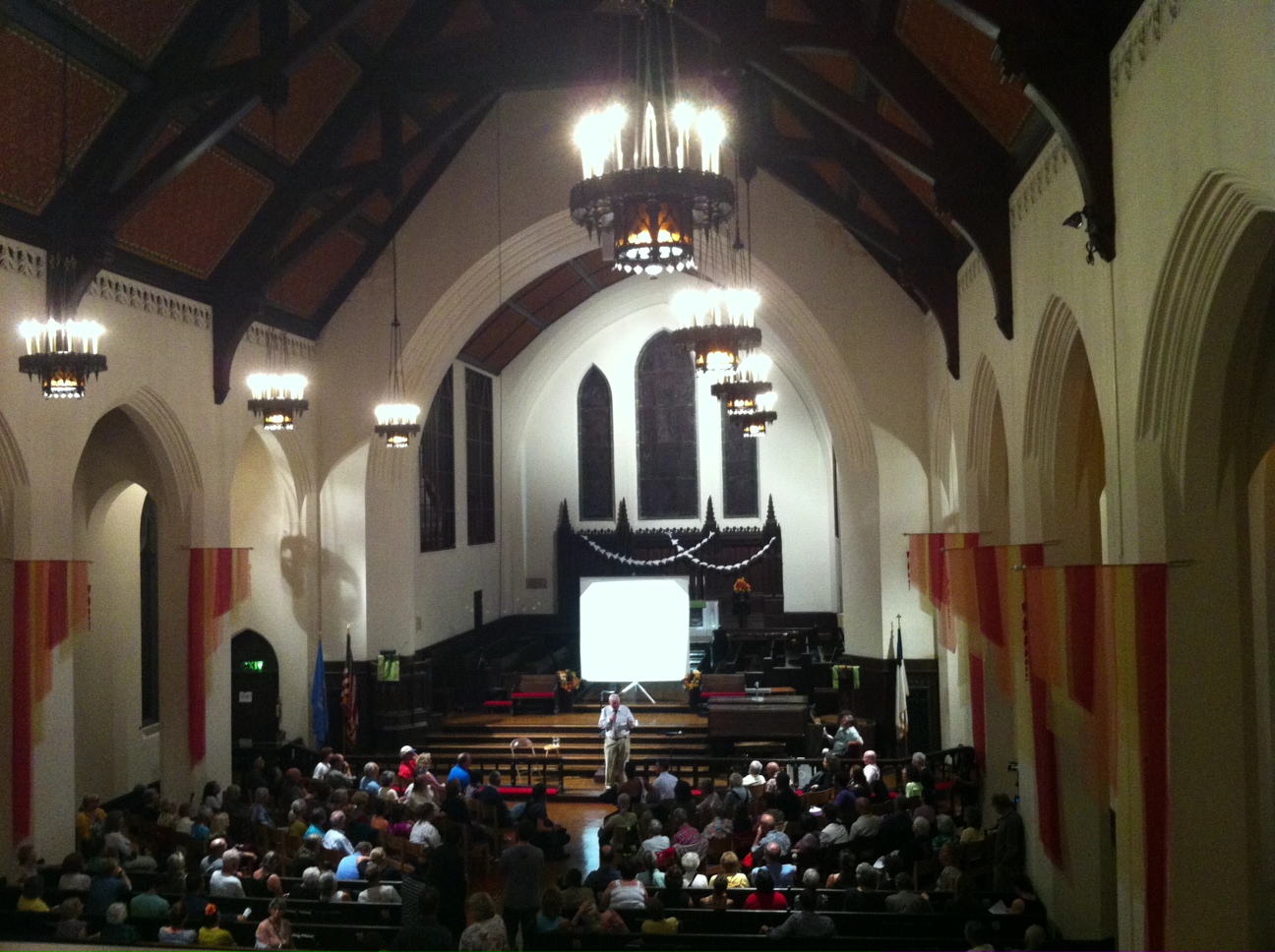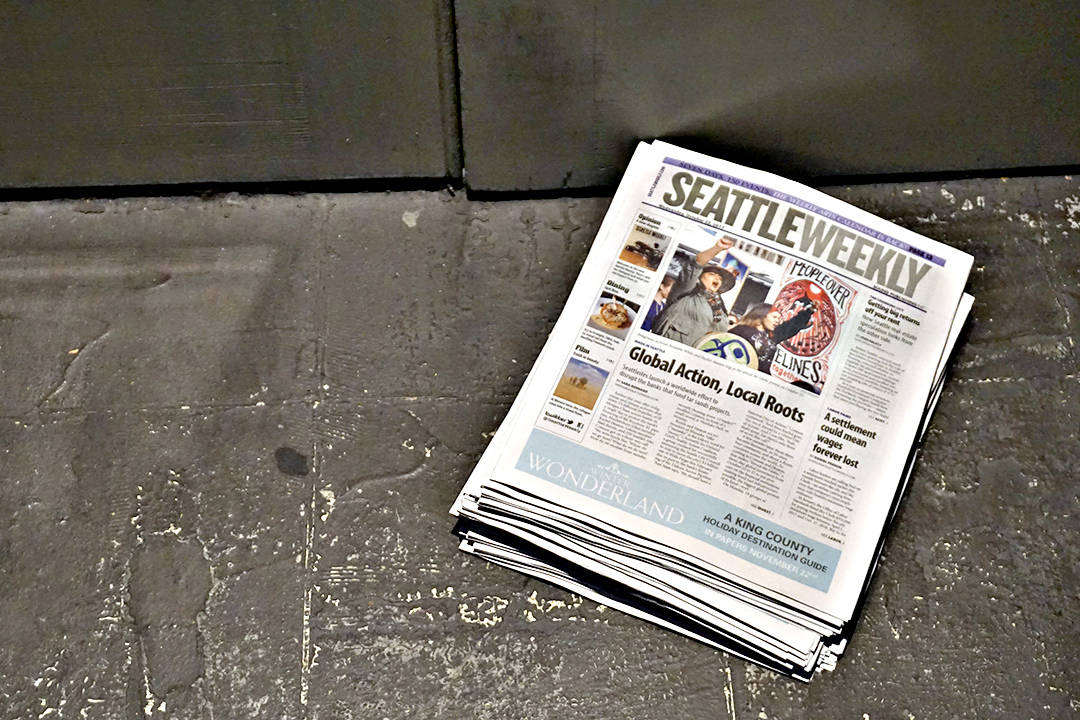Sunday night about 1,000 of Seattle’s most politically active citizens gathered at the University Temple United Methodist Church in the University District. Before them stood Representative Jim McDermott. Behind him was a map projected onto a screen showing the cluster of Middle East countries that have yet again shifted to the forefront of the American psyche. Bold in outline was Iraq, but the rest were there as well: Iran, Saudi Arabia, Israel, Jordan, and, of course, Syria.
Despite what that bold outline indicated, Syria was the reason for this gathering. President Barack Obama last month called for a missile strike on the country following allegations that its leadership broke the international ban on chemical weapons. In reports and videos it appeared that the forces of President Bashar al-Assad had gassed 1,400 of his country’s citizens, including many children, near Damascus.
Dressed in business casual and a bolo tie, McDermott set the stage. “We hear that there is a proposal that we go in to have a limited strike in Syria to show the world that we, as Americans, are unaccepting of the idea of the use of chemical weapons,” the congressman said. “And that the world must know that that is not a civil way to interrelate with one another in war or anything else. And yet, the consequences of the limited strike and the wider war that may come from that are troubling to a lot of us. Murphy’s law of unintended consequences is well-known and often when things start off in a certain direction, they wind up in another. You may remember Iraq; we were supposed to be in and out in 60 days and over 10 years later, we were still enmeshed. For someone like me who represents 700,000 people like you, it is a heavy responsibility to decide what we are going to do. That is why I wanted to have this meeting.”
By pointing to Iraq, literally, on that map behind him, McDermott was partaking in the most common of analogies for the proposed strike. The map was a relic of a decade past when, McDermott says, he stood beneath this same vaulted ceiling, pointed to this very same map, and told his constituents of the build-up to an American invasion of Iraq. McDermott was one of the losing votes against the authorization for that war. On March 20, 2003, the U.S. invaded, hunting for Weapons of Mass Destruction. Then Murphy’s law took over. When the war finally ended, at the end of 2011, we left the country empty handed.
It is the specter of that military action that is being credited with cooling the West’s rush to this one.
“One thing is indisputable,” said British Prime Minister David Cameron two weeks ago, following the parliament vote against his proposal to support a punitive strike on Syria. “The well of public opinion was well and truly poisoned by the Iraq episode and we need to understand the public skepticism.”
Likewise polls indicate that the American people are against the strike, as is Congress, which could very well be voting on an authorization to strike before the end of the month. Unsurprisingly, McDermott put in with that lot last night, stating that he was leaning against voting for the authorization. The sustained applause that followed indicated that the crowd was in agreement. But some weren’t so sure.
“I’ve heard a lot of political calculations to this humanitarian issue,” said a woman in a turquoise dress when the floor opened up for comment. “So that’s disappointing. Meanwhile, people are dying, women and children and everything. And this is a democracy, but we aren’t all sitting in those intelligence briefings, but maybe you are. So you are the experts in that regard. So you might be called on to make an unpopular decision if you have information that we don’t have. But finally I’ll just say that I’m leaning strongly towards favoring a strike, but I’m not 100 percent. But I’m disappointed also in the certainty that people have in being absolutely opposed to a strike or absolutely for it. This is a very complicated situation.”
A tempered applause followed, soon speckled with boos.
“Everybody is entitled to express their opinion,” said McDermott, who worked as a child psychiatrist prior to being elected to congress in 1989. “My response to your comment is that you’re right, it’s a very complicated issue. You can’t look at those videos … of youngsters dying from inhaling gas … as a child psychiatrist you can’t look at them, or as a father, and not be terribly upset. But the question still remains; what do you do about that? And that’s the question that we are really struggling with…. Would the strikes make it better? is really my question.”
A man with a shaved head identifying himself as Syrian American stood up next. One of six people dressed in t-shirts that read, “Free Syria … Strike Assad,” he appealed to McDermott and the larger crowd. “For those who are questioning the use of chemical weapons by the Assad machine,” he said, “someone who would kill 125,000; do you think they are incapable of using chemical weapons?”
The same tempered applause followed, as did the boos. “Who paid you?” shouted one young man in the balcony.
“The threat of the strike has already saved a lot of people’s lives,” the Syrian man continued over the dissent. “If you send jet fighters it will save a lot of children.”
A short powerful woman took the microphone next. “Why don’t we use all this money and all this energy to take care of the refugees?” she said to enthusiastic applause.
So the hour-and-a-half back-and-forth went, with most speakers against the strike, but many still in favor. As the discussion careened through the history of American foreign policy, theories of who exactly dictated U.S. interests abroad were floated, and practical approaches to solving the Syria problem were presented. Eventually, though, it came down to analogies. Almost every U.S. military action of the last 60 years seemed to be trotted out, sometimes by McDermott, sometimes by a speaker who had researched deeply to better understand the situation, and sometimes, I’m quite certain, by an activist who had combed the Internet in search of a justification that matched what his or her gut had already decided. It was difficult to tell one from the other as the event quickly devolved into a fog of wars.
In addition to Iraq, McDermott pointed to the Vietnam War as an example of the U.S. falling victim to its own hubris. Some in favor of a strike on Syria pointed to the military successes of Grenada and Kosovo. In the latter’s recasting, Assad played the role of Slobodan Milosovic, the warlord who would eventually be brought to the international criminal court at the Hague.
A limited engagement in Iraq in 1998 was presented as evidence of the potential success of a missile strike. Then someone reached way back, dusting off the U.S.-backed Iranian coup of 1953 and using it to show how, in the long-term, intervention can shape a region against U.S. interests.
The failure to act in response to the Rwandan Genocide of the mid-’90s was held up as reason to forcefully end the killing in Syria. It was mentioned that the U.S. had cold feet then, as well, due to the military’s embarrassing failure in Somalia in 1992. Because of those cold feet, a pro-strike activist said, hundreds of thousands of people died. A few minutes later an anti-intervention activist again brought up Somalia, but this time as an example of what can go wrong when the U.S. goes forcefully into a place it doesn’t understand. The message was clear: nothing is clear.








